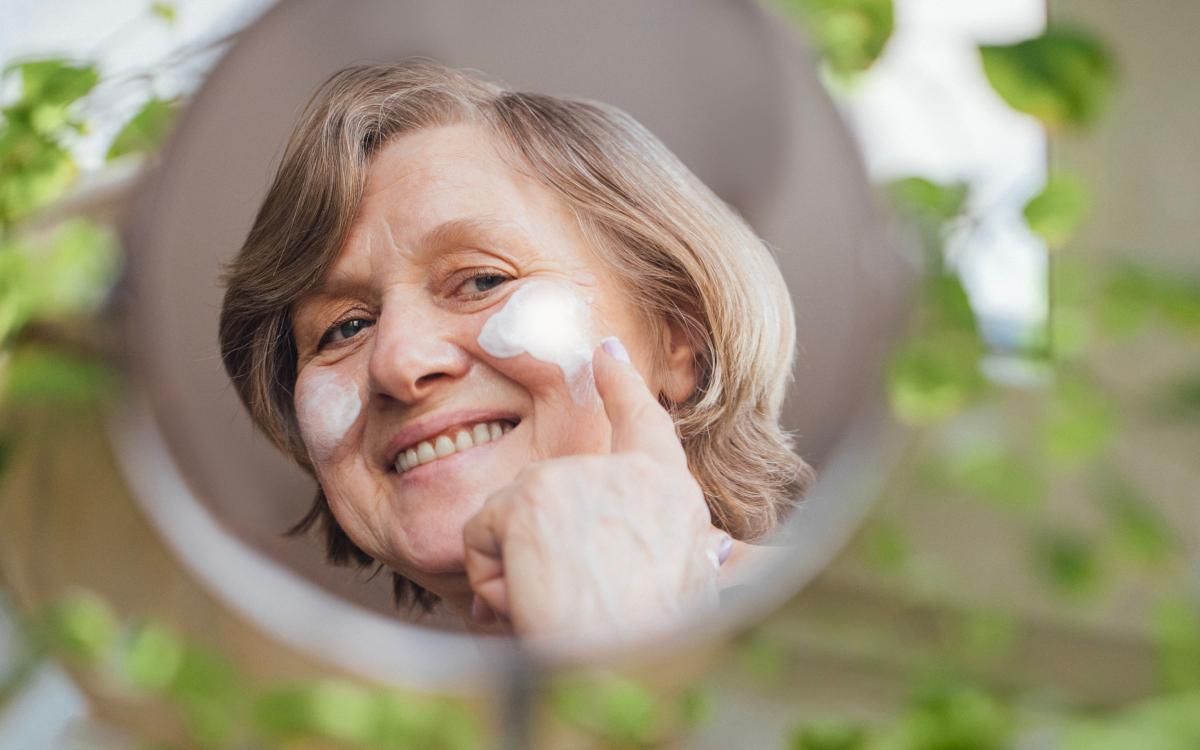How your skin looks and feels often tells the story of how well you care for yourself, and nutrition is a huge part of how you write this story. It influences how your skin renews, repairs, and protects itself. The glow you see on the outside often starts with taking care of yourself from the inside. From the strength and elasticity of your skin barrier to its healing ability, the foods you eat and the nutrients they provide determine how gracefully your skin ages.
Why Nutrition Matters for the Skin
Skin is the body’s largest organ, and just like every other organ in your body, your skin’s health depends on proper nutrition. The things you put into your body have a direct impact on how your skin looks, feels, and heals. As you age, the importance of eating right and the connection between your nutrition and skin becomes even more apparent.
This is because aging slows down cell turnover, collagen production, and the skin’s ability to retain moisture. All of these cause wrinkles and fine lines, increased dryness, and, sometimes, even hyperpigmentation. Eating right can support your skin health and help counter these changes while maintaining radiance and elasticity.
Improves Skin Barrier Function
Your skin barrier or stratum corneum is the first line of defence for your body. It is responsible for protecting you against pollutants, bacteria, allergens, and moisture loss. A strong skin barrier means you have hydrated and supple skin. It is responsible for locking moisture in, maintaining hydration and texture, and keeping irritants at bay. This also means that when your skin barrier is compromised, you have to deal with an extensive list of skin concerns. A damaged skin barrier means you may experience dryness, itchiness, and frequent redness and infections. Nutrition directly influences how well this barrier performs and how quickly it can recover from stress or damage.
Nutrients That Build the Skin Barrier
This barrier is made up of several elements. For instance, essential fats, or lipids, form the base that holds skin cells together. The lipid layer is made up of fatty acids that keep the skin soft and hydrated. A proper balance of these fatty acids prevents transepidermal water loss, a leading cause of dull, tight, or flaky skin.
Additionally, vitamins A and E are vital for maintaining the barrier’s integrity. They work together to keep the surface smooth, resilient, and better equipped to handle external stress. When these nutrients are consumed regularly, they create a foundation for lasting protection.
Supports Skin Structure and Strength
Under the skin barrier is the dermis, or the dermal layer of the skin. It is a dense matrix made up of elastin, collagen, and connective tissue. This layer is responsible for your skin’s structure, elasticity, and firmness. As you age, collagen production decreases, leading to fewer collagen fibers and a thinner dermis. This causes your skin to show signs of aging, such as fine lines, wrinkles, volume loss, and sagging.
Eating nutrient-rich food can help you significantly slow this process and support the body’s ability to protect and produce structural proteins. Nutrition plays a pivotal role in maintaining the skin’s natural structure and integrity.
Nutrients That Support Skin Structure
Vitamin C is an essential nutrient that helps prevent collagen loss and is crucial for the synthesis of collagen filaments. This powerful antioxidant helps protect the skin’s dermal layer from oxidative stress.
Eating protein-rich food also helps maintain the skin’s firmness and strength. Both collagen and elastin are made from amino acids. If you ensure adequate protein intake in your daily meals, you can combat both skin tissue and muscle loss that result from aging.
Other nutrients, such as polyphenols, zinc, and silica, too, are important for the skin. These nutrients improve elasticity, giving mature skin a firmer and more lifted appearance.
Aids in Repair and Healing
The skin constantly renews itself with cell replenishment cycles. It replaces damaged cells and tissues with newer ones. This is how your skin heals itself from wounds. The process of cell replenishment also helps the skin restore its natural balance after sun exposure, irritation, and pollution. When you nourish the skin properly, its natural repair mechanisms work at full speed, providing it with the energy, enzymes, and other essential nutrients for new cell formation. These nutrients are all the more essential, as the aging process slows down the skin’s natural repair cycles.
Nutrients That Promote Healing and Regeneration
Nutritional support is vital to ensure the skin continues to heal properly and maintains its protective functions. Zinc is a crucial nutrient that supports skin healing. It accelerates tissue repair and reduces skin inflammation. It is also important for managing skin sensitivity and preventing infections. Vitamin C plays an important role in cellular repair and collagen support. It helps speed up recovery after sun exposure. Other vitamins, such as pantothenic acid (B5), support wound healing and hydration.
When your body has access to optimal levels of these nutrients, your skin repairs faster and develops greater resistance to future damage. This regenerative ability of the skin is particularly important if you experience redness after sun exposure or seasonal dryness, or if you are prone to bumps and bruises.
Other Essential Nutrients
Your skin’s health isn’t just a result of the serums and moisturisers you layer on it. It’s not to say that sun protection and other skincare habits aren’t important. It’s just that skincare also means what you eat and the quality of nutrients your skin has access to. Your body, including the skin, relies on a steady supply of proteins, vitamins, healthy fats, minerals, and hydration to repair and renew. These nutrients help keep mature skin supple, resilient, and glowing.
Protein and Amino Acids
Protein is quite literally the building block of your skin. Skin components, such as collagen, elastin, and keratin, all make up amino acids, which are also referred to as structural proteins. They are responsible for your skin’s firmness, flexibility, and strength. Reduced collagen production is a natural and direct result of the aging process. When you include enough protein in your meals, your body can easily make up for this decreased production, keeping your skin healthy.
When you eat enough protein, your skin has an ample supply of collagen and elastin-stimulating foods. Aside from the obvious, protein plays a role in skin repair. It helps with wound healing and even with regular repair after exposure to the sun, stress, and pollutants. It also reduces sagging and skin dullness.
So, how can you ensure you get enough protein? Aim to include one protein source for every meal. You do not necessarily need to increase your protein intake; just be consistent with your intake. You can also mix up plant and animal sources to ensure a rice mix of essential amino acids.
Fatty Acids
Fatty acids are crucial for maintaining your skin’s lipid barrier. It is the thin layer of fatty molecules that locks moisture into your skin. Protecting the skin against environmental stressors is also part of this lipid barrier’s functions. Omega-3 fatty acids and omega-6 fatty acids are among the skin-friendly fatty acids you need to focus on.
Fatty acids help reduce your skin’s inflammation and redness. They reduce irritation and keep your skin supple by strengthening its cell membrane. With consistent intake of fatty acids, you can see your skin’s dryness and softness improve over time.
Both omega-3 and omega-6 are crucial for your skin. But you also need to make sure you are including them in the right ratio. Most meals are richer in omega-6 than omega-3 fatty acids. You need to intentionally add omega-3-rich foods to your meals to meet the recommended intake levels. This keeps your inflammation in check.
Vitamins
When considering skin health, think of vitamins as efficient multitaskers. Each vitamin contributes to maintaining good skin health and helps other vitamins and nutrients do the same. At the same time, each vitamin also has its unique role to play.
Vitamin A is your skin’s renewal agent. It encourages cell turnover, reduces dryness, regulates oil production, and evens out texture. Vitamin C, on the other hand, is the collagen catalyst. It provides antioxidant defence, fades dullness, and promotes even skin tone, all while supporting and stimulating collagen production.
If you want better cell defence against pollutants and stressors, you may want to consider vitamin E. Meanwhile, for better skin renewal and immune support, consider adding vitamin D-rich foods to your meals. Vitamin D is especially important if you do not spend enough time outdoors soaking in the sun.
Minerals
Minerals, like vitamins, are important micronutrients for maintaining healthy, glowing skin. But you also need to ensure they are only required in small quantities. When included in your meals in the right amount, minerals can greatly increase your skin’s resilience.
Zinc, for example, helps with wound healing, reduces inflammation, and regulates oil production. Selenium, a powerful antioxidant, helps fight oxidative stress and reduce damage caused by environmental stressors. Magnesium, on the other hand, supports hydration and inflammation control, and copper supports collagen and elastin formation. If you want glowing skin and a brighter complexion, you can consider eating iron-rich foods.
Vitamins and minerals often work together to maintain skin and body health. This is why it is important that you strike the right balance of these nutrients in daily meals. Remember that balanced meals made with varied ingredients can easily help you meet the recommended intake levels.
Probiotics
Probiotics play a vital role in promoting healthy skin. They work by balancing your gut microbiome and improving the population of good bacteria essential for gut health. Good gut health helps you control inflammation and enhance nutrient absorption.
Foods rich in probiotics help you strengthen your skin’s natural defence against breakouts and irritation. Fermented foods are your best friend when you want better skin and bowel movements. Add a small serving of fermented or probiotic-rich food daily. It can support not only digestion but also the skin’s overall balance and glow. When the gut thrives, the skin thrives.
Environmental Factors That Affect Skin Health
You might be working on your skin health by eating well and investing in skin-friendly products; however, you may still find yourself with dry, flaky, and inflamed skin. This may be due to environmental factors. Pollution, stress, and dehydration can quietly drain your body of essential nutrients, which can show up on your skin as visible signs of aging. If that is the case, understanding how these elements work against you and how you can defend your skin is crucial.
Chronic stress pushes your body to produce more cortisol, which in turn increases inflammation and interferes with collagen production. And it increases inflammation. When you are constantly under stress, chances are your body is depleting its vitamin and mineral banks faster than anticipated. This can also be due to the increased levels of pollutants in your environment today. Additionally, factors such as excessive caffeine intake and prolonged exposure to UV rays and air conditioning can also exacerbate skin issues.
To minimize the effects of environmental factors on your skin, consider investing in an air purifier to reduce exposure to airborne pollutants. You can also wear a mask or carry an umbrella whenever you go out, or when UV levels are high.
Common Deficiencies That Show Up on the Skin
Your skin is great at giving you clues when something is missing. Notice early if there are any signs of increased dullness, dryness, or redness, or slower healing. This is your skin trying to tell you it is running low on nutrients and high on oxidative stress. Paying attention to these changes can help you correct small imbalances before they become larger concerns.
Vitamin C and vitamin B complex deficiency are common to spot from your skin’s current state. If your skin appears dull, bruises easily, heals slowly, and shows signs of aging, you need to include more berries, lemons, and peppers in your meals. If you have chapped lips, redness around your nasolabial folds, or flaky skin patches, consider adding vitamin B to your meals.
Low iron can make your skin pale or sallow, while low zinc levels can cause redness, a rough texture, and longer healing times after cuts and breakouts. These changes are your body’s way of asking for better nourishment.
Nutrition-Based Habits to Adopt for Healthy Skin
Consistent habits can help you achieve long-term skin health. These daily practices keep your skin hydrated, nourished, and energized from within.
Ensure That You’re Hydrated
Lack of hydration is a common reason your skin appears dull and dry. As you age, your sense of thirst may start to decrease. This can also be a contributing factor to your skin’s appearance. Keeping up hydration levels can help combat this issue.
Try incorporating herbal teas into your daily routine to meet your body’s hydration needs. You can also include water-rich foods, such as oranges, melons, and cucumbers, in your meals. And if plain water does not appease you, flavor it with berries, lemon, or mint. You can also consider reducing your caffeine intake.
Consume Skin-Friendly Snacks and Smoothies
Smoothies are an easy and delicious way to treat your skin to vitamins, antioxidants, and hydration all at once. They’re especially helpful if you prefer light, nutrient-dense meal and snack options.
Try simple skin-glow smoothie blends that include vitamin C-rich foods, such as berries; iron-rich foods, such as spinach; and probiotic-rich foods, such as yogurt, to restore your skin’s former glory and enhance it further.
Try Meal Planning for Skin Health
It is important to make your food work for your body and skin. Aim to include fruits and vegetables of multiple colors throughout the day. Also, rely on minimally processed foods, such as whole grains, nuts, seeds, lean proteins, and healthy oils. These provide you with steady energy and a brighter complexion.
A nourishing plan can look like Greek yogurt with berries and flaxseeds for breakfast, lentil salad with colorful veggies and olive oil dressing for lunch, and grilled fish with quinoa and steamed greens for dinner.
When you meal plan around color and texture, you ensure that your skin receives a wide spectrum of nutrients.
Common Nutrition Mistakes That Impact Skin Health
Sometimes, your habits might be harming your skin without you even realizing. For instance, drinking excess tea, coffee, or other caffeine is one such habit. It can leave your skin appearing fatigued. To avoid this, try to balance each dehydrating beverage with an equal amount of water or herbal tea. Similarly, too much sugar can mess up your skin health. Sugar is a known promoter of glycation and weakens your skin’s collagen fiber bonds. This speeds up aging and the appearance of wrinkles. So, it is best to consume refined sugar in moderation. If you have a sweet tooth, you can consider fruits or dark chocolate instead of sugar-laden treats. Additionally, eating irregularly can disrupt your metabolism and nutrient absorption.
When to Seek Professional Guidance
Skin concerns might not always seem like a big deal on the surface, but there might be something deeper at play, which might need an expert’s attention. Suppose you experience recurring rashes, redness, hyperpigmentation, or excessive dryness. These might be your skin’s way of telling you it is dealing with some underlying imbalance.
You can speak to a nutritionist for guidance on identifying underlying deficiencies and food sensitivities. At the same time, speak to a dermatologist and find out if there are any conditions you should be aware of.










There are no comments yet